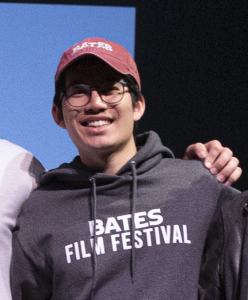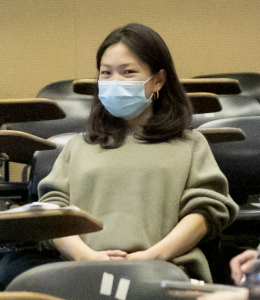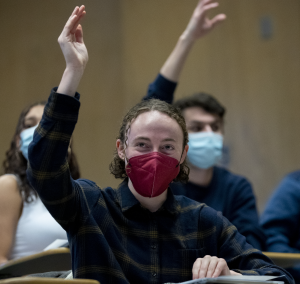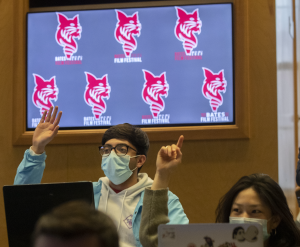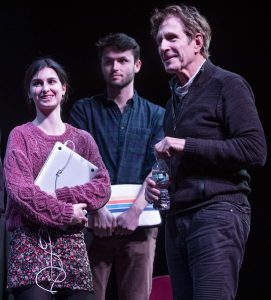By Ethan King (BFF 2019; Bates Class of 2021)
The process of choosing the films that were shown at the 2019 Bates Film Festival produced conversations that were, for me, simultaneously the most fascinating and frustrating aspects of the class. This had nothing to do with my classmates, or Professor Cavallero, and everything to do with me.
I love talking about movies. It’s something I regularly do at home with family; we even make lists of our ten favorite films of the year and share them with each other in the days leading up to New Year’s Eve. I can recognize now that much of my interest in television, films, and filmmaking stems from the conversational and expressive landscape it provides my family. I’ve learned a lot about other people by asking them what their favorite movies are, or discussing a specific one with them. In one of these conversations I can often get a better understanding of what they look for in art, what they can relate to, what repulses them, what qualities they value in a character or a story, and I wind up getting insight into them. Essentially, talking about film is a fundamental tool in my social arsenal, and it’s just as useful to disagree with someone about a movie or a director as it is to find one you both revere. It might be a conversational crutch, but it’s worked out pretty well so far.
Talking about films in the context of programming a festival is a completely different undertaking, and I didn’t realize that until after it was well underway. When one defends or criticizes a film or a programming decision, it’s more than an assessment of the quality of the story, the acting, the cinematography. While those are certainly relevant factors, one also has to take into consideration what the film stands for, the unique perspective of the filmmakers, and most of all how it functions in conversation with the other selections, among a number of other elements that extend beyond just what you saw on the screen. A thoughtfully programmed festival is not like a weekend with your friends watching your favorites, but something more challenging and immersive: an exploration of a few shared ideas, the pursuit of a few carefully selected themes through a series of diverse viewpoints. My opinions and actions during the programming process were often motivated almost entirely by the former set of qualifications, not by the more subtle latter. Once I realized where my views were concentrated, I could adjust accordingly. This initial inclination stemmed from the fact that, in my opinions on films over the years, I was centering my judgements around the experience they created, the hour or two I spent watching, what was communicated during that time, how meaningfully it was communicated, and what I felt like I walked away with.
“A thoughtfully programmed festival is not like a weekend with your friends watching your favorites, but something more challenging and immersive: an exploration of a few shared ideas, the pursuit of a few carefully selected themes through a series of diverse viewpoints.”
The process of programming the Bates Film Festival forced each board member, me especially, to review how we wanted to define the subjective labels of ‘good’ or ‘bad’ in relation to the films we were considering. I wondered how to weigh the importance of aspects like diversity (both in the individual productions and in the collection of films as a whole), budget, representation, and the conventional standards of ‘good’ filmmaking (e.g. the quality of the acting, dialogue, editing, set design, etc.), which can be a relatively subjective area on its own. I wondered to what degree the board was supposed to take our audience into consideration when making programming decisions.
Among the various readings assigned in the class was an essay by film journalist and critic Jean-Michel Frodon called “Cinema Planet,” in which he gave what I thought was the most helpful description of the importance of programming in the creation and maintenance of a festival:

Programming means that there is someone there, someone who has made choices – and for various reasons a large amount of people trust these choices, and these people wish to follow the propositions of the programmer. The legitimacy of a considered programme can be evident in its originality, or its internal coherence, or its strong relation with some especially appealing external factor. (207)
Based on what attributes of programming Frodon considers legitimizing, the conventional standards of ‘good’ or ‘bad’ filmmaking actually aren’t very relevant. If, for instance, the “internal coherence” of the festival orbits around a presentation of films made on low budgets, then the set design or special effects will almost always be of lower quality than what you’d see in a release from any major Hollywood studio or even ‘festival films’ from more prominent directors. There’s also the element of “originality,” which makes me wonder if showing a film that didn’t resonate with me might still contribute to a more ‘legitimate’ program, because the obvious inclination is to show films that you are excited about and expect the audience to enjoy. This wasn’t my mindset during the discussions of programming; I primarily wanted to screen movies that I thought were the best stories.
It’s easier to understand this practice by applying it to an imaginary but essentially plausible film festival. For instance, if you were designing a festival that explored the development of the slasher genre which progressed from Hitchcock’s Psycho, to The Texas Chainsaw Massacre, followed by A Nightmare on Elm Street, and eventually leading to Happy Death Day, you could attach a meaning to these films that they wouldn’t have on their own. Despite the relatively undeniable disparity in quality between Happy Death Day and Psycho, even someone frustrated by the former would have a better understanding of its themes and may be able to deem it more worthy of contemplation when placed alongside the latter.
Even knowing all of this now, I still wouldn’t have changed my decisions on what we programmed, but I would’ve changed how I argued for them. I was in a group responsible for selecting the narrative films and I’m proud of what we chose, I wouldn’t have made any changes. However, I’m sure my thought process in the conversations that informed these decisions could’ve been refined. My appeals too frequently operated along the lines of critique or praise of the mechanics in each story, which are among numerous other factors that should generate a balanced decision. Thankfully, my fellow board members had a better grasp of these considerations and were able to apply them where necessary, but at the time, while enmeshed in the deliberations over whether a film was to be included or not, I often didn’t understand why we couldn’t simply apply the conventions of traditionally respected filmmaking to the decision. This was shortsighted, and it made the process much more difficult for me than it needed to be.
Hopefully in writing this I can help someone interested in joining the Bates Film Festival board to realize the kinds of arguments he/she/they should expect and even entertain when entering the programming process. Maybe this can be useful for circumnavigating the singular approach I had to judging films, and receiving judgements on them. Whether you’ll be working on a festival or not, this relation of my experience might help clarify the reasoning behind many of the programming decisions made in film festivals, at Bates and elsewhere.
Work Cited:
Frodon, Jean-Michel. “Cinema Planet.” The Film Festival Reader, edited by Dina Iordinova, St. Andrews Film Studies, 2013, pp. 205-215.


